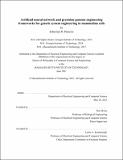Artificial neural network and precision genome engineering frameworks for genetic system engineering in mammalian cells
Author(s)
Palacios, Sebastian
DownloadThesis PDF (59.62Mb)
Advisor
Weiss, Ron
Terms of use
Metadata
Show full item recordAbstract
Synthetic biology is an emerging engineering discipline that merges biology with engineering design principles with the objective to engineer novel biological behavior in living organisms. The engineering process in synthetic biology, however, is often unpredictable and inefficient. Therefore, there is a need for the development of frameworks that enable efficient and predictable engineering in synthetic biology. In this thesis, I introduce machine learning and precision genome engineering frameworks aimed at advancing the engineering process in mammalian synthetic biology.
The genome engineering framework is a recombinase-mediated cassette exchange (RMCE) landing pad. I apply this framework to address challenges associated with organoid engineering, such as the lack of ability to reliably engineer organoid formation and maturation. In particular, I demonstrate the engineering of a genetically encoded miRNA sensor in hiPSCs and their differentiated derivatives, including derivatives generated using GATA6-mediated and Neurogenin-mediated directed differentiation. The sensor provides a fluorescent readout based on the activity of a specific miRNA with single-cell resolution, and has applications in organoid engineering and basic research. The machine learning frameworks are comprised of artificial neural networks. In particular, I introduce the use of artificial neural networks applied to the problem of modeling and optimization of genetic systems, which I demonstrate on a biological cancer cell classifier, a type of genetic system for discriminating cancerous from noncancerous cells. Moreover, I introduce the use artificial neural networks trained on single-cell flow cytometry measurements aimed at modeling and predicting the behavior of genetic systems in mammalian cells.
Together, these frameworks advance our ability to engineer genetic systems in synthetic biology. In particular, the results in this thesis demonstrate the utility of artificial neural networks for genetic system engineering in mammalian synthetic biology. Moreover, I expect that the genome engineering framework described can be employed synergistically in the context of constructing and implementing genetic systems designed utilizing the machine learning frameworks presented in this work.
Date issued
2021-06Department
Massachusetts Institute of Technology. Department of Electrical Engineering and Computer SciencePublisher
Massachusetts Institute of Technology